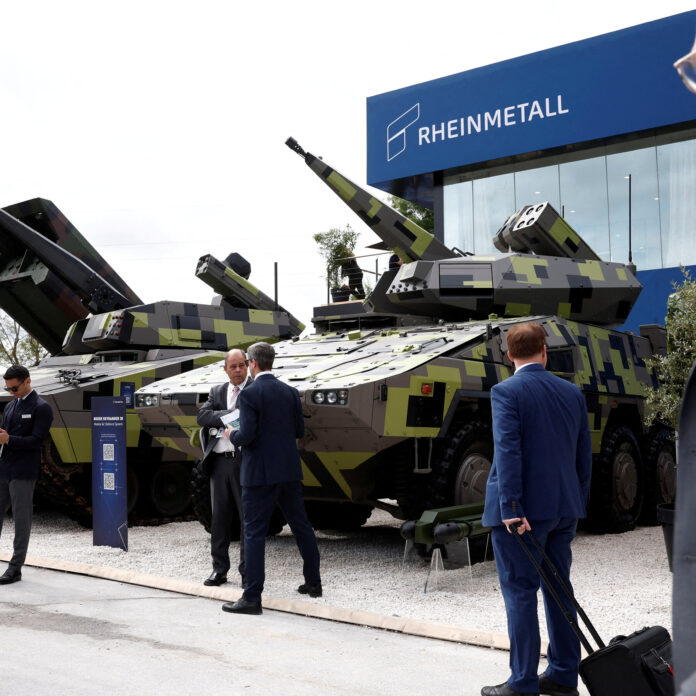A Clear Step Toward a German-Led Military Rebuild in Europe
On Wednesday, August 27th, 2025, deep in the wooded countryside of Unterlüß in northern Germany, a ribbon-cutting ceremony without pretense marked a pivotal moment in Europe’s slow but deliberate militarization. Rheinmetall, the German arms giant, unveiled what will soon become the largest ammunition factory in Europe. The event, attended by NATO’s new Secretary-General Mark Rutte, was anything but symbolic.
Behind the scripted speeches and institutional smiles, the message was unmistakable: Berlin no longer hides its ambitions. This is not merely a reaction to Russian aggression or a gesture of solidarity with Kyiv. It signals a profound restructuring of Europe’s strategic landscape, with Germany at the helm, leading with steel, not soft power.
Rheinmetall: Europe’s Armed Backbone
It took just fifteen months to erect the robotized halls of Unterlüß. On a site spanning five football fields in Lower Saxony, Rheinmetall aims to produce up to 350,000 artillery shells per year by 2027, including 155mm rounds with a range of 40 kilometers. The first deliveries are expected before year’s end, primarily to restock the Bundeswehr and to supply Ukraine through bilateral or multilateral channels.
This facility is no accident. It is the culmination of a historic pivot, launched in 2022 when Russia’s invasion of Ukraine shattered Germany’s post-Cold War pacifism. The days of relying on America’s strategic umbrella are gone; Berlin is crafting its own deterrent, albeit still within the NATO framework.
“The defense industry in Germany, Europe, and North America matters more than ever,” declared Mark Rutte, citing the “rapid and opaque military buildup” of Russia and China. But one must question: are Western stockpiles ramping up purely out of necessity, or have they become the engine itself? The narrative aligns closely, too closely, with U.S. talking points.
German Rearmament: The Taboo Has Fallen
German rearmament is no longer a political third rail, it is official doctrine. Defense Minister Boris Pistorius put it plainly: “Germany must assume greater responsibility for Europe’s security.” Translation: Berlin no longer seeks permission—it commands it.
Rheinmetall, already Europe’s largest producer of artillery and tank munitions, is becoming the industrial spine of this transformation. Listed on the DAX, the company invested over €500 million into the Unterlüß site, with full government backing.
The factory is just the start. Next year, it will begin producing rocket engines in cooperation with none other than Lockheed Martin. While the transatlantic link remains intact, the initiative clearly lies with Germany. They build. They supply. They lead.
A Full-Spectrum Military Expansion
To staff this war machine, Berlin recently passed legislation to streamline military recruitment—including a partial mandatory military service, should voluntary enlistment fall short. Years of neglect have gutted the Bundeswehr’s manpower, and that gap must now be filled—urgently.
Parallel to these structural reforms, Germany has committed to a dramatic fiscal shift: 3.5% of its GDP will be spent on defense by 2029, triple the levels seen before the war in Ukraine. This is not a temporary uptick; it is a reorientation of the entire German economy toward militarized production.
Germany in 2025 is no longer Merkel’s cautious republic. It is becoming what many in Washington and Moscow have long feared—or hoped for: a self-reliant military-industrial power, exporting order, hardware, and fire.
Unterlüß and the Return of German Strategy
This is no mere factory. It is a strategic statement. The opening of Europe’s largest ammunition plant symbolizes nothing less than Germany’s return to the front line of geopolitical affairs. The post-WWII aversion to overt military power has been shelved—quietly, decisively.
Whether Anglo-American strategists welcome it or not, the facts remain: Germany is building, arming, and preparing to lead. And Europe, as history has shown, will follow.



